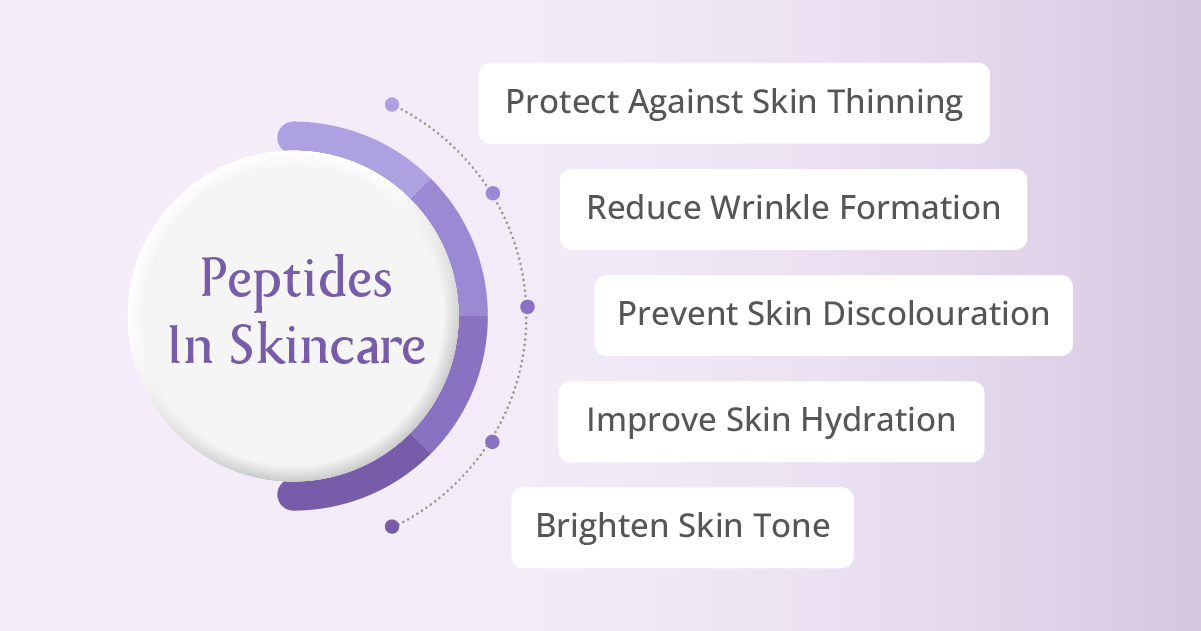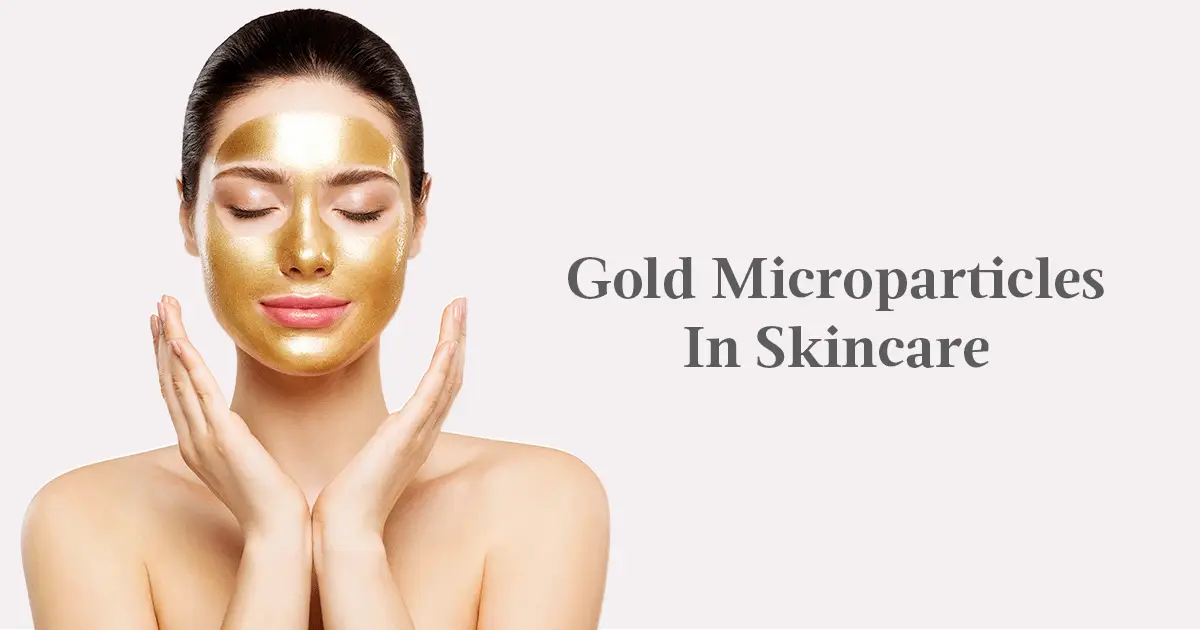
Hey, beauty buff! Are you always on the lookout for the next best skincare ingredient? Then you would have probably come across the term ‘peptides’. From serums to moisturisers, these peptides in skincare have quickly become the new favourites of brands and skincare enthusiasts alike. So are they just another buzzword? Or is there some real science to justify their increasing popularity?
This blog walks you through the basics of peptides; what they are, what they do, and whether your skin really needs them. So keep reading!
What Are Peptides?
Peptides are short chains of amino acids (building blocks of proteins) which are added to skincare products. To understand this better, let’s assume that amino acids are like letters. Just as a few letters come together to form a word, amino acids put together in short chains form a peptide. And when multiple peptides are interlinked together, it creates a polypeptide, which is essentially a protein.1
Peptides support your body in producing collagen and elastin: proteins which are vital for healthy, youthful skin. When peptides are abundant, your body has the essential building blocks it needs to form these strengthening protein fibres.1
Peptides In Skincare: What They Do For Your Skin

1. Reduce Wrinkle Formation
Peptides help prevent wrinkles by strengthening the skin layers, which weaken with age. By boosting the synthesis of several proteins, such as collagen, laminin, and nidogen, peptides improve the stability of skin and its texture. Studies have shown that just using peptides topically for two weeks can significantly reduce wrinkle formation.1 2
2. Prevent Skin Discolouration
Peptides take a multifaceted approach towards reducing hyperpigmentation in the skin. By targeting enzymes which are involved in melanin production in your skin, they help to prevent skin discolouration. Additionally, they also boost the production of certain components of your skin’s extracellular matrix. This not only helps improve skin tone, but also its structure and overall strength.1
3. Protect Against Skin Thinning
Ageing is often accompanied by skin thinning due to the loss of collagen and elastin fibres. Peptides play an important role in stimulating the production of these proteins, which in turn slows down the skin thinning process. Certain peptides also counteract the enzymatic process which is involved in the breakdown of collagen proteins, thereby improving the firmness and integrity of your skin.1
4. Improve Skin Hydration
Peptides contribute to skin hydration by enhancing the skin's natural moisturising capacity and strengthening the skin barrier. They also help to stimulate the production of hyaluronic acid in your skin. Hyaluronic acid acts like a moisture magnet, which traps water in the skin, preventing it from drying out and becoming flaky.1
5. Brighten Skin Tone
Topical peptides can help brighten the skin by reducing melanin production and supporting the skin’s natural exfoliation. By blocking enzymes that trigger excess melanin, peptides help prevent dark spots and uneven patches. They also encourage cell turnover, helping the skin shed dead and dull cells. And this helps you achieve a fresher, more radiant appearance.1
Different Types Of Peptides In Skincare
Based on their function and how they work, peptides can be categorised into the following types:3
1. Signal Peptides
Signal peptides help your body form specific structural proteins. These proteins are essential for helping your skin regenerate itself and stay firm. They send ‘signals’ to specific cells in your skin, namely fibroblasts, encouraging them to generate more collagen, elastin and other proteins, which are crucial for maintaining its integrity. They not only promote protein synthesis but also boost cell turnover and unveil a brighter skin tone over time.
2. Neurotransmitter Peptides
Repetitive contractions in your muscles during smiling, crying and expressing other emotions lead to fine lines and wrinkles. As you age, you may notice subtle changes such as crow’s feet and frown lines. Neurotransmitter peptides work by targeting the communication system of your skin. These peptides prevent the contraction signals from reaching your facial muscles. And this, over time, leads to a more relaxed and smooth facial appearance. Such peptides could be a non-invasive, safe and natural alternative to Botox (Botulinum Toxin), which smoothens fine lines through a similar mechanism.4
3. Carrier Peptides
Carrier peptides can bind to trace elements (like Copper or Manganese) and deliver them straight to those sites on your skin which need them. These trace elements are needed for several skin repair activities such as wound healing, antioxidant action and the production of collagen and elastin. By supporting the healing and repair mechanisms in your skin, these peptides help regenerate skin and accelerate its damage repair process.
4. Enzyme Inhibitor Peptides
Enzyme inhibitor peptides protect the skin’s integrity by inhibiting enzymes that break down important proteins in your skin, like collagen and elastin. These enzymes become more active during ageing and when the skin gets exposed to environmental triggers such as pollution and UV rays. And this accelerates the breakdown of the skin’s supportive matrix, leading to thinning, wrinkling, and loss of firmness. Enzyme inhibitor peptides counteract this process by interfering with these enzymes and delaying visible signs of ageing.
How To Choose The Best Skincare Products Containing Peptides
With multiple brands promising miraculous results with their peptide-based products, it could be difficult to pick out the best one for your skin. Because it takes a thoughtful combination of the right ingredients in the right proportions to get actual results.
So if you’re on the lookout for your perfect peptides in skincare, you might want to consider AreoVeda’s Skin Brightening Serum, formulated with NaturePep® Pea—a multi-active skin correcting peptide that addresses dark spots, hyperpigmentation, and skin roughness. The serum, while giving long-lasting hydration, also promises to visibly reduce pigmentation in just 28 days. We are India’s 1st cellularly proven, EWG-verified & Ecocert-certified skincare brand that specialises in skincare products for pregnant women, moms and babies.
Peptides In Skincare: Drawbacks & Limitations
Peptides are great for improving your skin texture, tone and overall appearance. However, like many skincare ingredients, they come with a minor drawback. On their own, some peptides may find it challenging to penetrate deep into the skin layers, which can affect how effectively they work. And that’s why formulation matters, and choosing only the right product can actually help your skin benefit from them.3
Summing Up
Peptides in skincare have become increasingly popular. And you can now see why. From preventing premature ageing to reducing skin discolouration and improving hydration, they can be your skin’s new best friend.
And while they may not be a magic fix, the right peptide-rich formula, like a well-formulated serum, can support your skin’s natural repair processes and deliver noticeable improvements over time.
FAQs
1. What Do Peptides Do In Skincare?
Peptides help reduce the appearance of fine lines, improve skin firmness, support hydration, and enhance overall skin texture.
2. What Is A Drawback Of Peptides In Skincare?
One common drawback of peptides is that some of them may struggle to penetrate deep into the skin, which can affect their effectiveness.
3. Which Is The Best Peptide Serum?
The best peptide serum is one that combines effective peptides with other skin-loving ingredients, such as AreoVeda’s Skin Brightening Serum.











